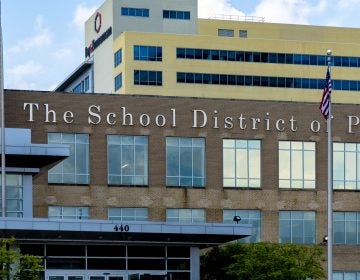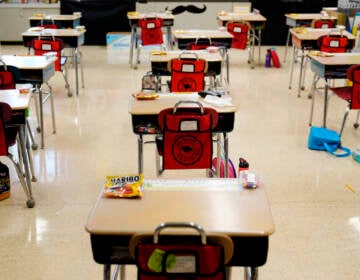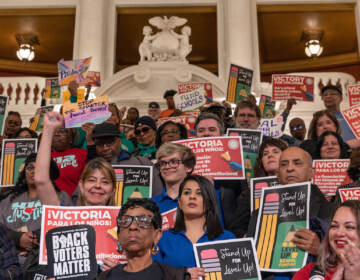Balloons floated away from David Williams’ gravesite on Valentine’s Day, released by the hands of loved ones trying to hold fast to his memory.
About a dozen people gathered at a cemetery in Lansdowne to remember David — known as “Dada” — and celebrate his birthday. This was the day he would have turned 19.
“We love you, Dada!” the group shouted as the balloons disappeared into the frigid, gray skies.
David was shot and killed in Southwest Philadelphia nine months earlier, on May 29, 2020.
“I want to have revenge every day,” said David’s older brother, who gave his name as “Vas.” “But that still won’t bring him back. We gotta handle certain situations in better ways, without resorting to violence.”
Gun violence in Philadelphia has dramatically worsened over the last year in tandem with the arrival of the coronavirus. In 2020, 499 people were murdered, up from 356 the year prior.
Many of the victims have been school aged. More than 300 people age 18 or under were shot in 2020, 37 of them fatally — a more than two-thirds increase from 2019.
So far, 2021 is on an even deadlier pace. Sixteen young people have been murdered this year, with a slew of fatal shootings in the past two weeks.
Every death creates a void, sending shockwaves of pain and grief.
“I try to move on every day from it, but I can’t,” said David’s niece, Nasira. “It’s hard. Somebody took him from me.”
Nasira is a freshman at Paul Robeson High, the same school David attended before his junior year was cut short. She was counting on her cousin to show her the ropes. Instead, she’s figuring it out alone.
“Every time I needed someone to talk to, I just talked to him,” Nasira said. “You know how you don’t really trust a lot of people, so you just have one go-to person? That was him.”
The spike in shootings has coincided with a year where most Philadelphia high schools have been fully virtual. Friends, family, and teachers of those lost say the absence of the safety and structure of in-person school can’t be ignored as a factor in the rise in deaths.
“I really don’t think that he would have been killed if they were at school,” said Tawanda Robinson, David’s mom.
At the same time, school communities have struggled to find ways to grieve during the isolation of the pandemic, if they find ways at all.
“If we had in-person school we could have had an assembly. We could have talked about it. We could have had our own vigil. And we would have. It would have been horrible, but it would have been a way to move on,” said Andrew Saltz, David’s English teacher at Robeson. “And here it’s just like, there’s nothing, there’s nothing you can do.”
In this edition of Schooled, which can also be experienced as a podcast, we are telling the stories of three Philadelphia students who were killed in the past year during the nation’s other public health crisis: gun violence.
***
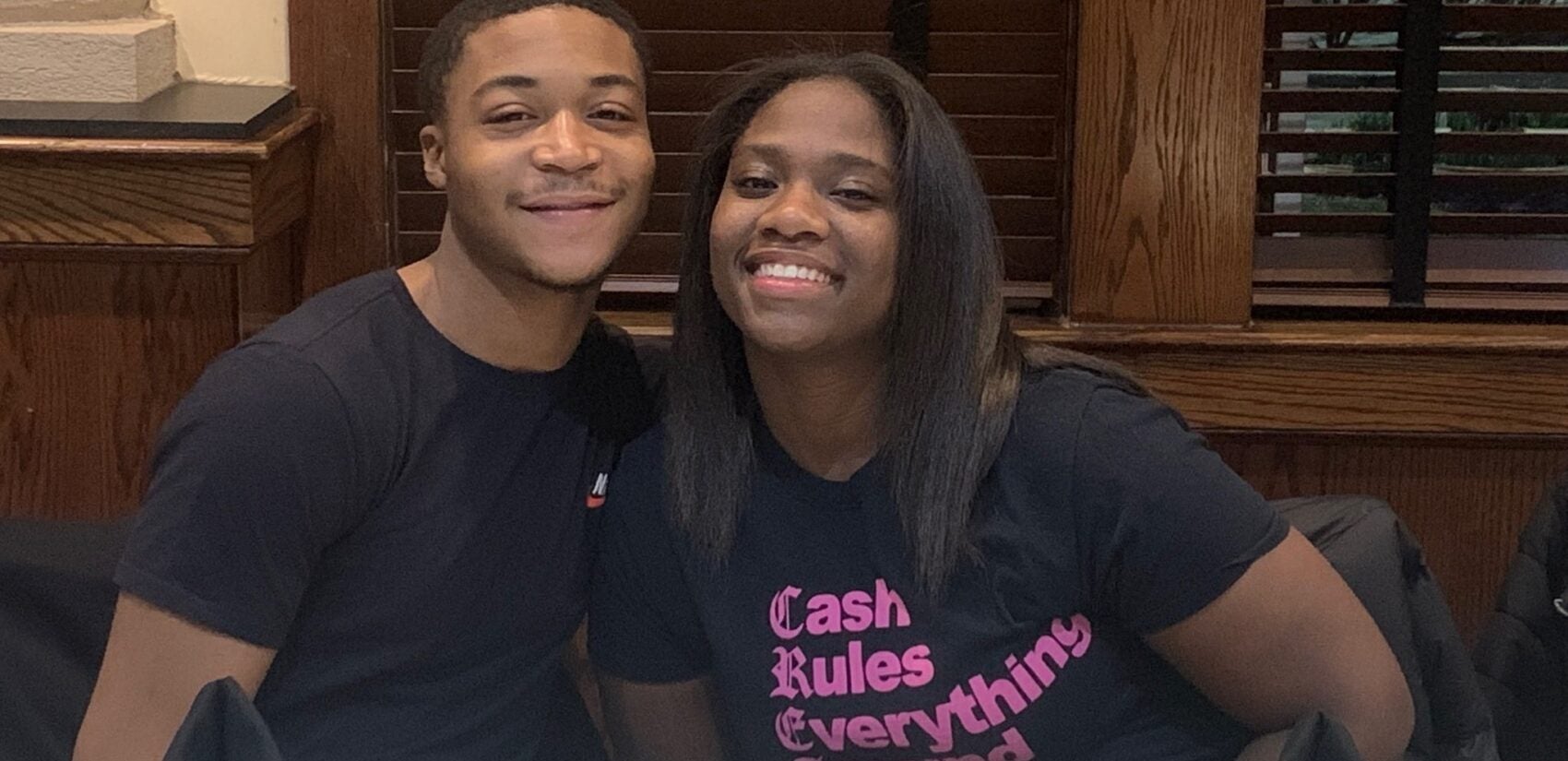
David Williams, 18
When Samantha Palmer was in high school, she had a rule: no dating boys in grades below her.
But in her junior year at Robeson High in West Philadelphia, David Williams, a tall, confident sophomore with a movie-star smile, approached her at her locker and asked for her Instagram handle.
She said yes. “I just loved his personality,” said Sam, now 19. “He was nice to others, and very thoughtful.”
She was quiet and considerate. He was loud and joyous — a king-of-the-school type.
Sam and David spent a lot of time watching YouTube videos of other couples, sort of domestic influencers. Eventually, they started their own channel: SD Filmz.
In long, lightly edited videos they captured the humdrum ups and downs of their life.
They filmed themselves pulling a prank on David’s mom, Tawanda, and David getting a sleeve tattoo. They described what each other would grab from a burning house (David said Sam would grab her lip gloss, Sam said David would save his AirPods) and how many kids they wanted (Sam: zero. David: four).
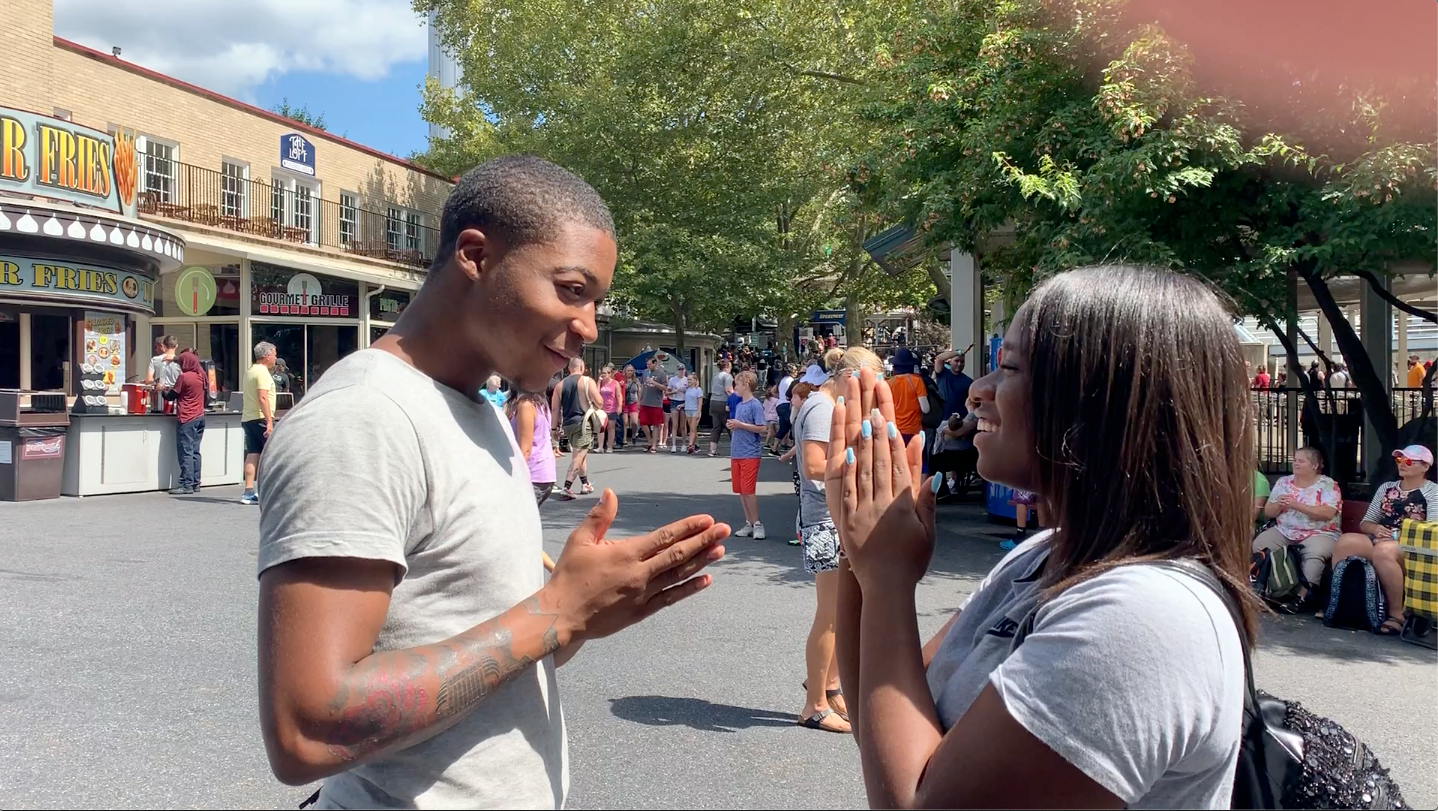
They also opened up publicly in a way that can be rare for teenagers. In one video, David described telling Sam he loved her for the first time just as she had stepped into a Lyft.
“I kind of snuck it in there. It was like, ‘I love you.’ and shut the door,” he said, quietly. “Cause I ain’t wanna wait to see if she was going to say it back or not.”
A strong support system
David also poured his feelings into his music. He was an aspiring rapper, writing under the moniker “215Dada.”
His mom had transformed the basement of their Southwest Philadelphia rowhouse into a recording studio, complete with a professional microphone, foam soundproofing panels, and a set of turntables.
Most nights, he was down there with his best friend Kweli Berry, an 18-year-old with a scraggly goatee and braces who raps under the name Li Rambo.
“He always told me like, ‘Keep pushing, keep pushing,’ Kweli recalled. “We gonna be somewhere one day. We gonna be somewhere.”

David got constant support from his mother, Tawanda Robinson: a 50-year-old homemaker with deep brown eyes and tightly-braided shoulder-length hair.
David was the youngest of Tawanda’s four children, and by the time he was a junior, he was the only one still living in the house, which made them uncommonly close. Tawanda sometimes referred to David as her “twin.”
“I am not trying to brag about anything but, you know, he was very intelligent,” Tawanda said. “I have a folder full of colleges that just wanted him.”
David’s teachers agree. When he put his mind to class, they said, he excelled.
“He could bring your class to life. He could tear it down in flames. He just had that ‘it,’’ said Saltz, the English teacher at Robeson. “In a just world, he’s class president, and it’s not even close.”
David’s African American history teacher, Kyana Hopkins-Thomas, said at one point she invited the University of Pennsylvania to come into the school and teach her kids how to cook healthy African food.
“Every week he was up there cooking,” she said. “He made sure to help them set up. Whatever needed to be done, he was right on the spot to do it … He was an absolutely wonderful, wonderful student.”
***
Early in 2020, the spring semester of David’s junior year, he seemed to be juggling his priorities nicely.
His grades were mostly solid. He was honing his music. And his relationship with Sam was strong.
Then, in March, COVID arrived in Philadelphia. And David’s balancing act started to fall apart.
The first thing the pandemic cost him was his daily interactions with Sam. Her mom was terrified of contracting the virus and didn’t want her meeting with people outside their household.
“My mom wouldn’t let anyone come into the house or let us see anybody,” Sam said. “All I could do is go to work and come home.”
Sam said they would watch movies together remotely, with both of them on their phones. But the relationship was harder to maintain after lockdown.
The pandemic also affected David’s school life. When class moved online, David almost never showed up. The relationships with teachers and school staff that kept him motivated didn’t have the same power through a computer screen.
“He’s there for us,” Saltz said. “He’s there for the social.”
David also lost his job at a Snipes shoe store, an important source of stability and financial security, when all non-essential businesses were forced to close.
With his weekday routine out the window, and without Sam by his side, David started hanging out with some guys who made Sam and Tawanda nervous.
Then, in the early morning hours of a Friday in late May, Sam woke up to a text from Tawanda that said the unthinkable: David was dead.
“I didn’t believe it, so I called her and it was ringing for a little bit, like, she wasn’t going to answer it. Then she answered,” Sam said. “Hearing his mom cry was the worst pain I ever felt in my life.”

All Tawanda knows is that David had gone to meet someone she didn’t care for. Police say the case is still active, but they haven’t made any arrests.
For Tawanda, the image she has of her son from that morning remains sharply clear and devastating.
“I couldn’t say goodbye to my child,” she said. “They let me see him, but he was already gone. When you see your child laying in the bed like that, it’s horrible. I couldn’t kiss my son. I couldn’t tell him that I loved him.”
‘I really try and forget’
Just as the pandemic threw David off balance, it has also thrown a wrench into traditional mourning rituals. For David’s friends, family, and educators, that has often meant processing grief alone, if at all.
For Sam, the sadness of losing her boyfriend is compounded by the unshakable feeling that, if the pandemic hadn’t arrived, he would never have been shot.
“He would have been with me. He was always with me — always,” she said. “His friends used to clown him about it, but I was really keeping him out of trouble.”
She’s tried to move on. Recently, she started her freshman year at Chestnut Hill College and moved into a dorm.
Seeking closure, Sam deleted the Youtube channel she and David shared. She tries not to watch the videos anymore.
“It’s probably not healthy, but I really try and forget,” she said.
For teacher Andrew Saltz, losing a student is not a new experience.
But nearly a year later, Saltz feels stuck. The pain is still there, but it’s harder to know how to carry on without being able to come together as a school community in person.
“It’s just really hard … You can bury yourself in the work,” he said. “And I know that’s not healthy, but that’s what we would do.”
Kweli is coping by holding on to any connection to his best friend. He’s stayed close to Tawanda, visiting at least once a week — ostensibly to take out the trash — but really to check on her.
Sometimes Kweli talks directly to his friend, too. On long walks in the neighborhood, and around the cemetery, he sees signs of David.
“I’ve seen a red cardinal bird,” Kweli said. “That’s like your loved one coming back to visit you, like when you need help or something. That made me feel good, knowing he was still there.”
He’s also processing his emotions through music — recording track after track since David died.
He performed one tribute to his friend, “Letter 2 Dada,” on Valentine’s Day, standing by David’s grave.
My homie’s voice is stuck in my head/ the closest I’ve got left of him
And I don’t even want new friends/ like, f— that, I want my brother
I told my dog I had his back/ I told him I had him covered
I’m sitting thinking, ‘What the f—?’/ I know that we had each other.
***
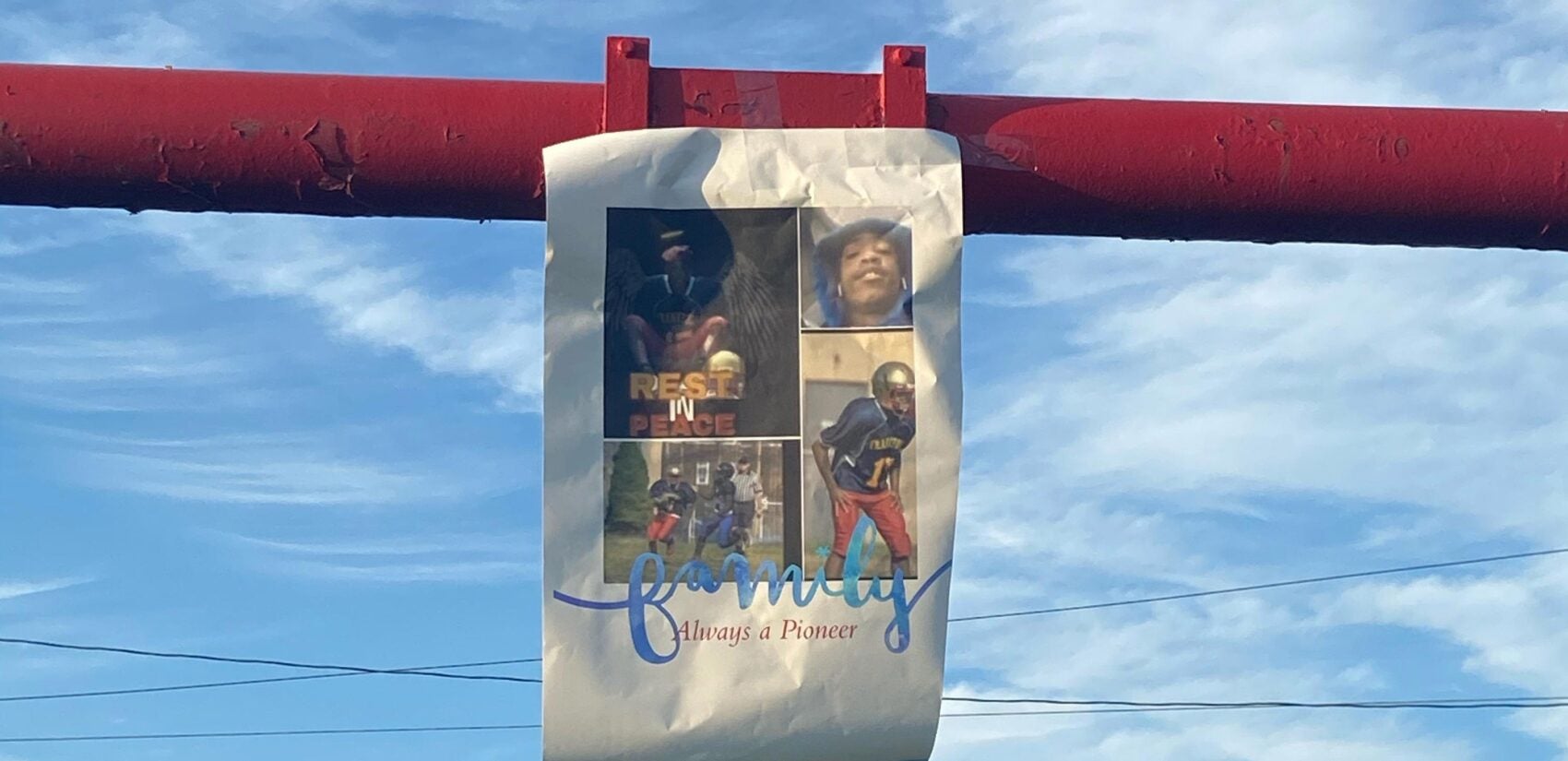
Angelo Walker, 15
On a Sunday night in July 2020, high school counselor Isabella DiBileo scrolled through an Instagram account called NoGunZone.
She was there out of habit.
NoGunZone posts breaking news about gun violence in Philadelphia and DiBileo often check if there have been shootings in the neighborhood where she works.
Weeks earlier, DiBileo had finished her first year as a guidance counselor at Frankford High School.
That night, she saw a dire headline about a shooting across the city in Overbrook.
“15-year-old shot in the head, found face down.”
DiBileo knew at least one 15-year-old from Overbrook. But after a pang of worry, she swallowed the thought and went to sleep. It couldn’t be.
Then, Monday morning, she learned that it was. A school social worker called DiBileo with the news.
“Angelo Walker was shot and killed last night.”
A pair of newcomers
Angelo Walker and Isabella DiBileo both arrived at Frankford High School in the fall of 2019 — he as a freshman and she as the 9th-grade counselor.

When the year began, DiBileo got a call from Angelo’s mom.
She’d picked Frankford precisely because of its distance from Overbrook, DiBileo recalled. She wanted to protect him from the dangers that lurked in his neighborhood. And she asked DiBileo — 25 years old and in her first year as a high school counselor — to look out for her son.
In a school of nearly 1,000 students, DiBileo sought Angelo out and made sure he got his physical so he could join the football team. From there, an attachment grew.
“Before I knew it, he was just a regular. He didn’t use his locker. He used my office as his locker,” DiBileo said. “He would leave his coat in there — his books in there. Sometimes I had to physically push him out.”
With Angelo as ringleader, a small group of regulars formed around DiBileo. The other staff would jokingly call them “DiBileo’s kids.” They were a loyal bunch, none more so than Angelo.
One day another group of students tussled inside the counselor’s office, splashing water around the room and ripping items from the wall. DiBileo left in tears to report the incident. When she got back, Angelo had returned everything to its proper place from memory.
“He was just, like, my guy,” DiBileo said.
DiBileo grew up in Scranton, Pa. and was just a few years removed from college when she got to Frankford. She was scarcely a decade older than the ninth-graders on her roster, and fearful that the students wouldn’t warm to her.
Angelo’s respect and loyalty were a kind of validation. She belonged.
He had to leave his house at 5:30 each morning to catch a cascade of busses and trains to reach Frankford High — which meant he’d often arrive earlier than DiBileo.
“There would be days when I would get to school and he would be standing at my office waiting for me,” she said.
When she heard about Angelo’s death, DiBileo thought about what it would be like on the first day back in regular, non-virtual school. She pictured Angelo hanging outside her office. Now she had to reconcile that image with the fact that he was gone.
“He was why I was so excited to go back,” DiBileo said. “I was so excited to see Angelo.”
‘There’s just so much grief’
Every time a young person is shot in Philadelphia, the school district’s head of safety gets an alert. His team’s first move is to run their name through the district’s registration database, to find out if the victim is a student.
If the answer is yes, the district drafts a memo to alert administrators at whatever school the victim attended.
That message makes its way downstream to guidance counselors like DiBileo, who then must balance personal grief with their job duties.
After Angelo’s death, DiBileo helped organize a memorial at the school, started a fundraiser for funeral expenses, and called Angelo’s mom to offer emotional support.
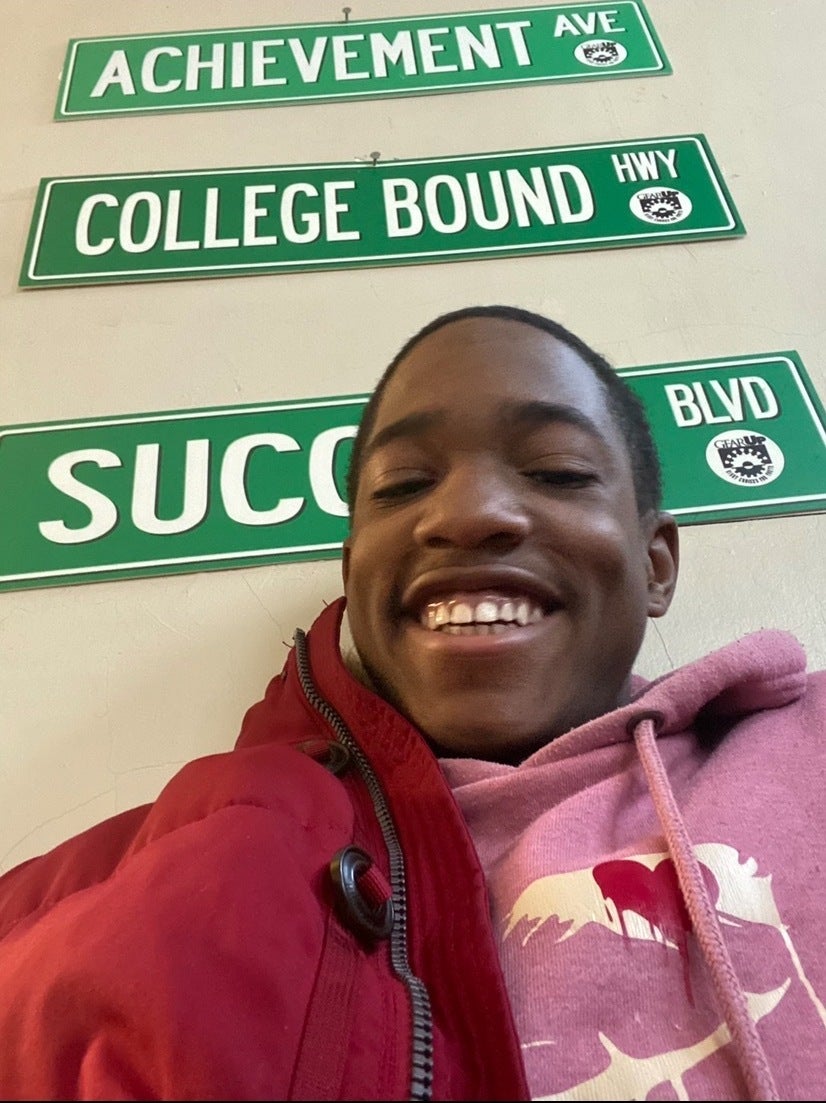
It is an overwhelming experience, even for counselors accustomed to feeling overwhelmed.
“There’s just so much grief — so much grief and violence,” said Theresa Cheshire, who has been a counselor at Mastery Charter’s Pickett campus in Germantown for the past 8 years.
At her school, Cheshire said, there’s usually one horrific incident every school year when a student who either attends the school or plays on one of the network’s shared sports teams is killed. But violence touches the school far more frequently. She estimates that about 20 times a year, a relative or friend of one of her students is killed in the city.
Cheshire has found there’s a careful art to managing the grief of teenagers, and counselors don’t always get it right. Come on too strong, and students may feel suffocated with attention or embarrassed in front of peers.
Sometimes, the best remedy is a pat on the shoulder, a little space, and a bottle of water to flush out the fight-or-flight hormones that course through a body in times of acute stress.
“Sometimes you have to pause for a moment,” Cheshire said. “The worst has already happened.”
In Philadelphia, there are nonprofits that offer more specialized grief counseling.
At Frankford, DiBileo brought in a therapy group called Uplift Philly to offer weekly virtual counseling to students who were friends with Angelo or had otherwise been impacted by gun violence that summer. They called it a “legacy group” and gathered in a video chat regularly for six weeks to share memories of slain friends.
“There is no goal — other than to let you know that grief is permissible,” said Samantha Anthony, one of the Uplift clinicians.
That grief can manifest as sadness, laughter — even conflict.
When a person dies, it’s common for people to plaster their picture across social media with a hashtag. And it’s also common for close relations to grow resentful when they see someone who barely knew their friend posting about the killing online.
The grief may feel real to the person posting, but can also come across as cheap or attention-seeking.
“They can kind of get very territorial about their friend,” said Tiffany Chalmus, another one of the Uplift counselors.
It is a complicated stew of emotions, made all the more complicated by its immediacy.
“They’re not only grieving the loss of their friend and classmate,” said Crystal Wortham, an Uplift staffer. “They’re also looking at their own mortality.”
***
Until Angelo’s death in the summer of 2020, DiBileo had never known someone who was shot and killed.
Not so for the students in her grief group.
One of the students was 15-year-old Annabel Salvador, a sophomore at Frankford. In the past year alone, she’s lost two middle school friends — both gunned down in the city.
“The reason I can cope with it is because I’ve been hurt so many times and so many people died that there’s nothing left in me,” Annabel said. “I don’t even know how to react anymore. I’m just living. But I feel dead.”
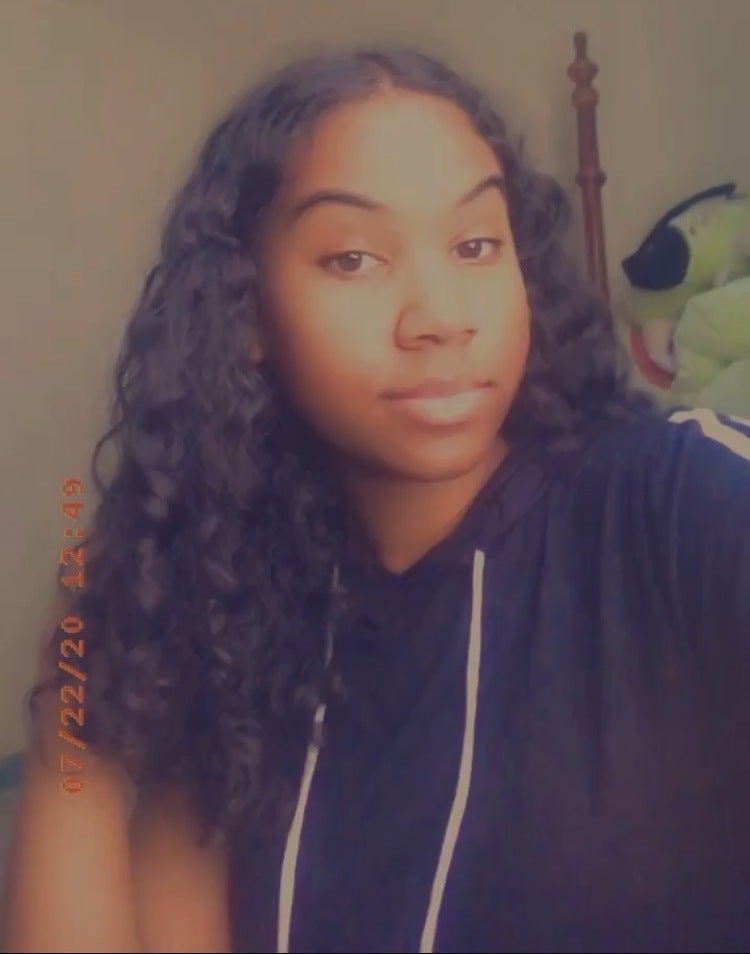
Annabel hears friends talk about revenge — getting even. She tries to ignore it. Whenever that empty feeling morphs into sadness or anger, she takes a hot shower and tries to go to sleep.
In her grief and fear, she’s developed a kind of tunnel vision.
“I feel empty. And I can’t do anything but keep motivating me to keep getting my grades straight and get out of Philadelphia and get into a good college and have a good job,” Annabel said.
After Angelo’s death, Isabella DiBileo started her own, informal check-in system for the students she knew would be reeling the most. A text here. A call there — just to make sure they knew she was around.
The correspondences ebb and flow. One week a student will text her non-stop. Then two weeks of silence.
One of the students she focused on most was a kid we’ll call Andre. We’re withholding his real name because he received threats after Angelo’s death.
Andre was one of Angelo’s closest friends. Like Annabel, his grief — at least in public — had a numbness to it. He’d lost relatives before. Angelo’s death came suddenly, but it didn’t shock him.
“He was just like, this is just a normal way to die for people in his life. It’s like having a heart attack,” DiBileo said of Andre. “‘Oh, they were shot and killed. It’s just another option for a way your life ends.”
Still, in private, Andre reeled. Andre’s grandmother and guardian, who asked to be identified as Sonia Smith, said his “spirit changed” after Angelo’s death.
“He became more leery,” she said.
Andre started eating and sleeping less, to the point he became “almost an insomniac.” Smith would get up in the middle of the night to find her grandson alone and awake.
He still refuses to take public transportation. If Smith can’t drive grandson or pay for a rideshare, Andre simply won’t leave.
“He doesn’t know who he’s gonna run into — because something may happen,” Smith said.

Slowly, over the last half year, the clouds hovering over Andre seem to be lifting. A therapist friend of Smith’s volunteered to help Andre for free. Recently, he came to his grandmother and told her that he thinks he has PTSD.
To Smith, the admission felt like progress. Her grandson finally had words for the thing he’s trying to wrestle.
“It’s just not emotional. It actually becomes painful,” Smith said. “It sits in your chest. It sits like that knot you get just before you bust out in tears. But imagine that knot sitting there all the time.”
Smith knows that dread personally.
When she was Andre’s age, she saw a man shoot a boy on his bicycle in North Philadelphia. That’s the same way Angelo died — shot while riding his bike.
“It never goes away. You just learn how to deal with it,” Smith said. “You learn how to live with your trauma. It doesn’t go.”
Andre’s anxiety is not merely his own. His grandma feels it and absorbs it. She prays for him constantly. She won’t go to sleep until she knows he’s in the house.
She’s consumed with a thought that should be a given. She wants Andre to become an adult — literally.
“At the end of the day his main thing that he’s trying to do is survive,” Smith said. “His aspiration right now is to make it out of his teenage years.”
Goodnight
These webs of trauma and coping feel endless. Each death sends more ripples through a school: kids, parents, grandparents.
DiBileo is responsible for about 450 students, day to day.
She tries to figure out who’s hurting and offer a lifeline. But there’s no method for curing the pain of all the people scarred by a student’s death.
And there’s no method for curing her own.
DiBileo tends to cry when she gets angry. With Angelo, the frustration and indignation would build until, like a tea kettle, she’d boil over.
“Any time I’d think about him I’d get so mad,” DiBileo said. “The system and the city and how this is a reality for our kids — like I would immediately get angry.”
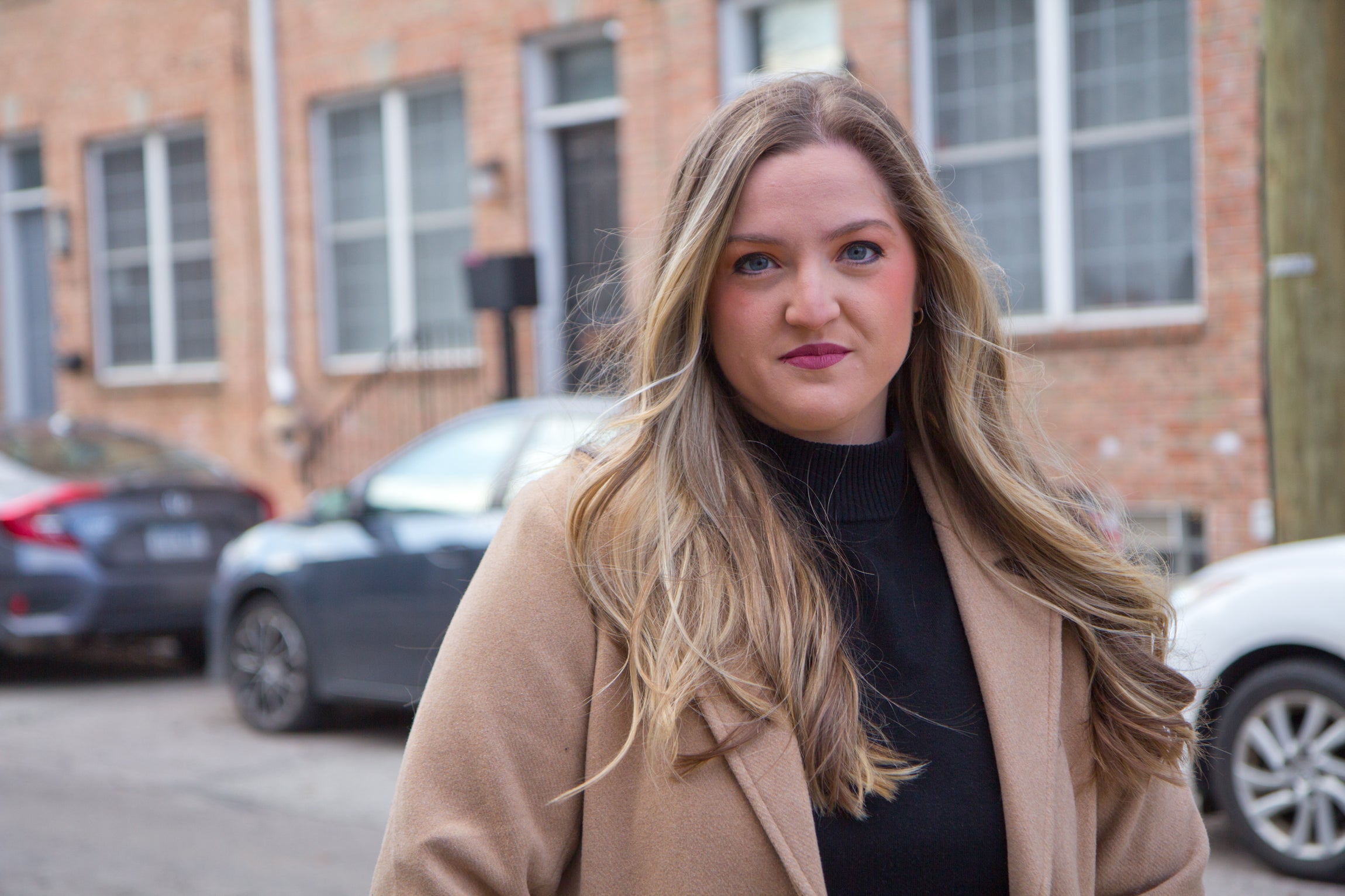
Although this was DiBileo’s first time losing a student to gun violence, she knew — in her own way — that it was coming. That’s why she’d been browsing that Instagram page the night of Angelo’s death.
When you’re a school counselor in Philadelphia, the thought always hovers.
“I know that it could happen,” DiBileo said. “You don’t think it’s going to. But you know that it can.”
When DiBileo ends a text conversation with students, she likes to punctuate it with a little reminder. The exact words vary, but they all grow out of the same place and the same fear.
Be Safe.
Be Good.
Stay Safe.
Make Good Decisions.
Her last, long text conversation with Angelo happened in mid-June. She signed off with a familiar phrase:
“Be good out there.”
DiBileo added the praying-hands emoji.
Angelo texted back.
“Goodnight”
With a heart.
Three weeks later, Angelo Walker was dead. He was 15 years old.
***
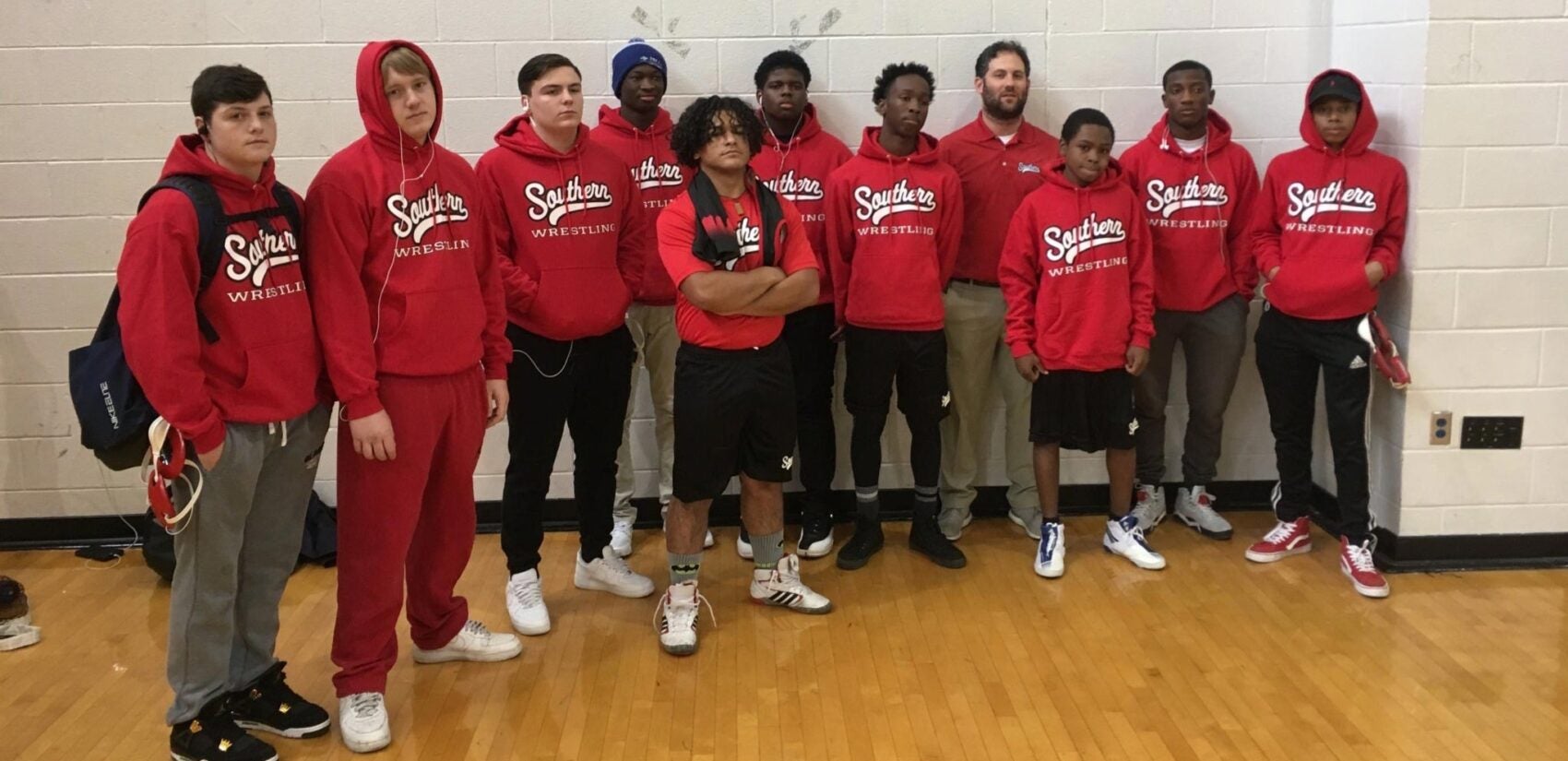
Tahj Williams, 17
David Williams and Angelo Walker — their deaths didn’t get all the attention they deserved, but local papers and television news gave them more credence than most.
Many of the people shot and killed in 2020 — or in any year — don’t get more than a passing mention.
You don’t find out much about who they really were, what they were passionate about, who they loved — who is left to grieve for them.
One of those deaths happened on April 23, a Thursday afternoon in broad daylight.
Tahj Williams, a 17-year-old senior at South Philadelphia High School, was killed near his home in Southwest Philadelphia — the 119th murder of 2020.
For the people Tahj was closest with at Southern, his death meant much more. They remember him for who he was when he lived: the school’s unlikeliest sports star.
A ‘little guy’ gets his big break
At first glance, Tahj seems like an impossible candidate for a star athlete.
He entered ninth grade under five feet tall and about 80 pounds. Pictures of Tahj from that time show him well shorter than his classmates, with warm eyes and a smile that made him seem a few years younger than his age.
Those who knew Tahj say he was the kind of person who could move easily between different crowds, even without being especially tight with any one particular clique.
His sense of belonging changed a few months into freshman year by a chance hallway encounter with Robert Schloss: the scruffy 38-year-old coach of Southern’s wrestling team.
“I’m sure I gravitated toward him immediately,” Schloss said. “I’m always on the lookout for little guys.”
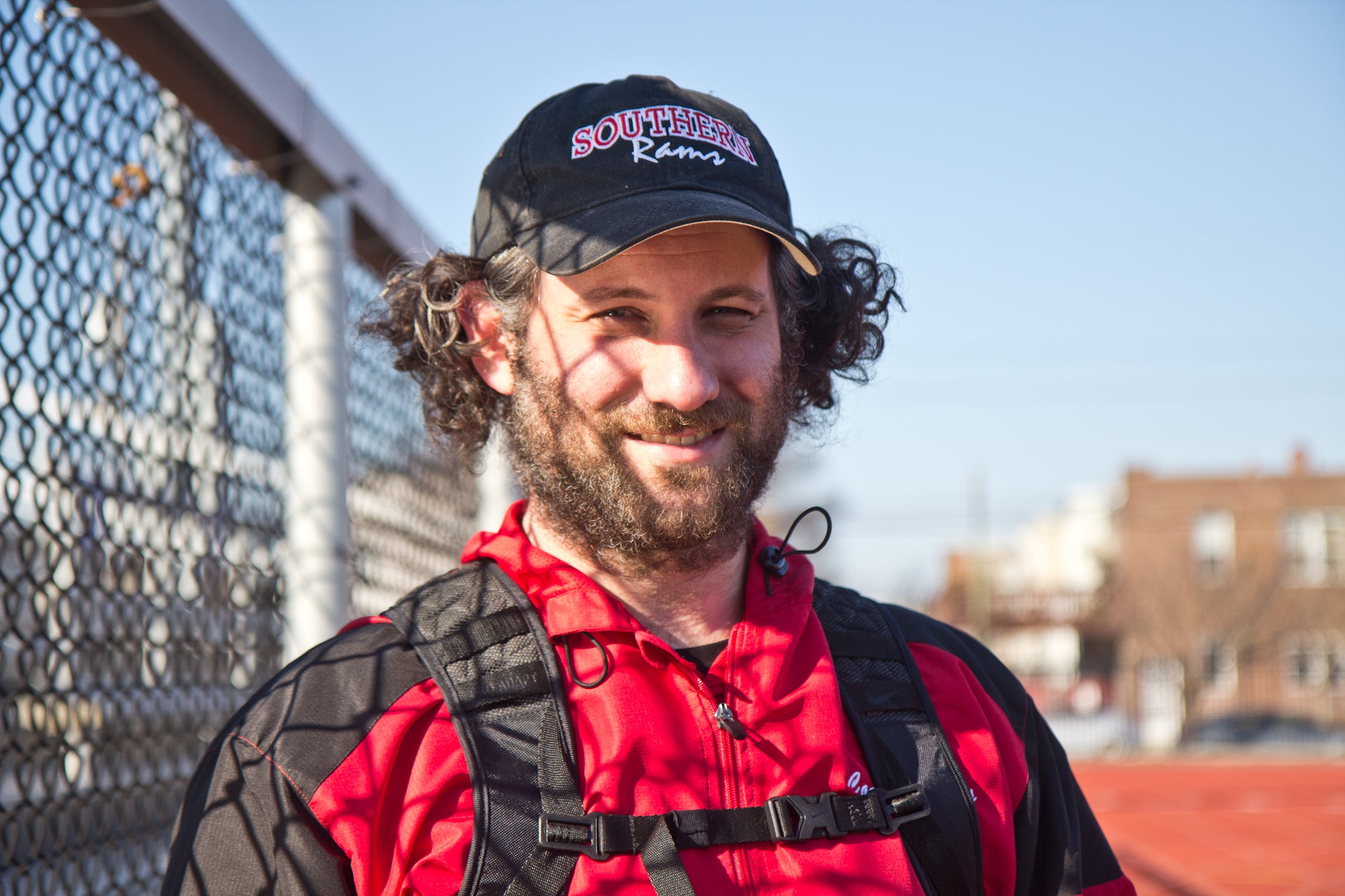
But Tahj also impressed his teammates with his dedication and tenacity.
“At first I was like, ‘OK, this is a little kid,’” said Edgardo Mendez, 20, who wrestled with Tahj before graduating in 2019. “But the kid would go at it. Like I remember, if me and him were [wrestling], he would not show me any mercy. Kid had heart.”
On the team, Tahj found a purpose and a community that had eluded him before.
“He had a place, he had a role,” Schloss said. “He was loved by his teammates.”
Tahj quickly joined the lacrosse team, which Schloss also coached, and became the team manager and videographer of the school’s varsity football squad.
He grew close with that team’s coach, Frank Natale, a mentor who ran high school sports programs in Philadelphia for decades. Tahj often struggled with his academics and Natale’s office became a refuge on tough days.
“Sometimes he would have issues in class and I would say, ‘You know what, tell your teacher you have to see Mr. Natale,’” said the 67-year-old coach. “We would talk about anything.”
He was always there with some advice, or a peanut butter cracker, or a dollar or two if the student needed it.
“He would come and see me every day,” Natale said. “He would check in every day with me.”
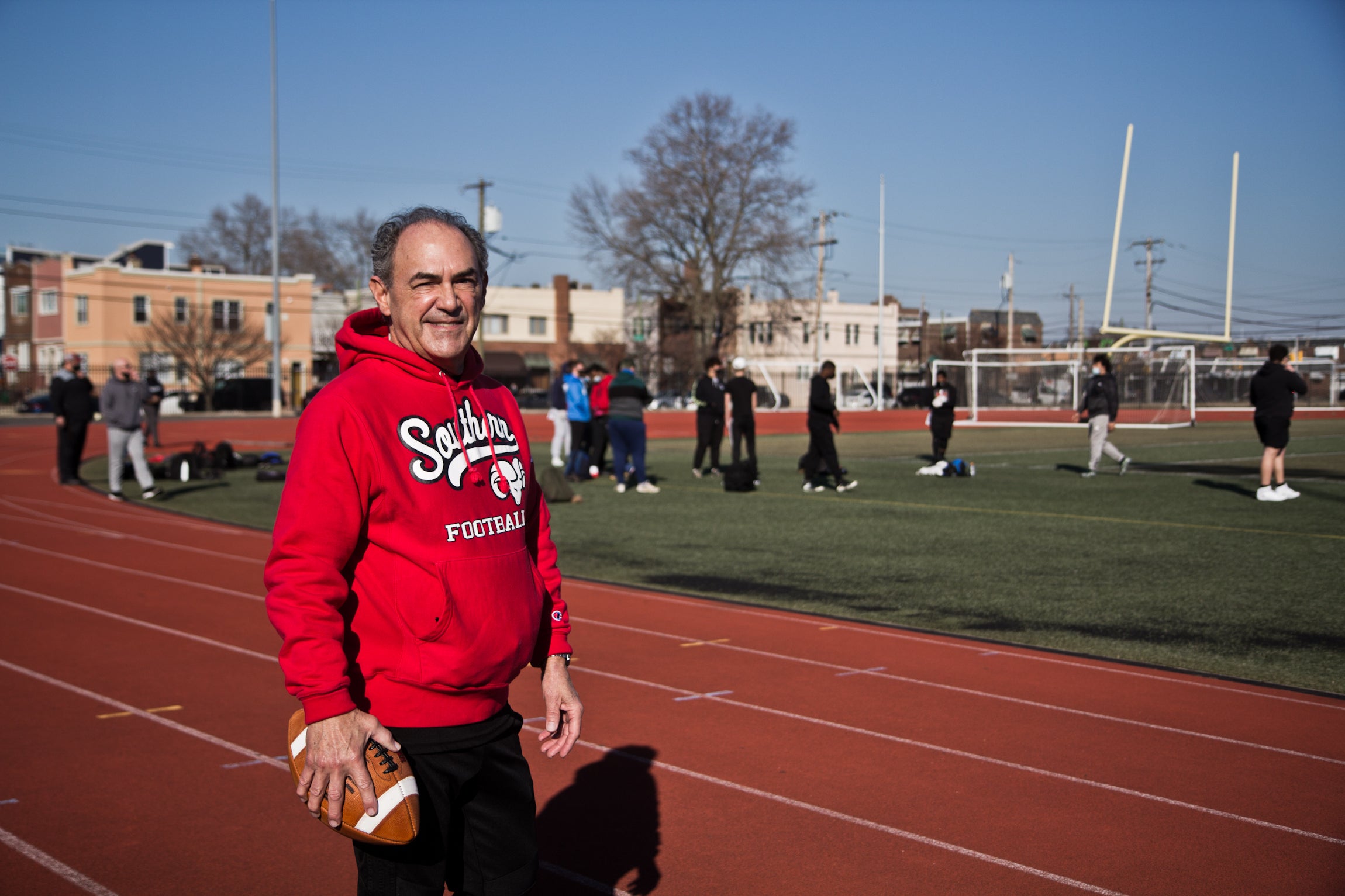
Natale has served as this kind of unofficial counselor for dozens of kids since he first started coaching high school sports in 1973.
It is the sort of personal connection that’s hard to measure, but educators know it can be crucial to building student confidence and keeping them on track for graduation.
Tahj’s proudest moment came during a Thanksgiving football game his sophomore year, when Southern was blowing out Palumbo High School.
Natale told him to put his video camera down, and suit up to play.
“We put him at outside corner and he ended up making a tackle,” Natale said. “So it made his whole life to be in a varsity game, and to make a tackle.”
A life derailed
In his junior year, Tahj started to lose his footing and he missed the wrestling season.
Schloss said it was because he was struggling in school, and needed to take part in a credit recovery program after hours, during the same time as wrestling practice.
Schloss said he stayed involved with the team, volunteering to run a candy and hotdog stand at a tournament that season.
“I can tell you he wanted to be wrestling,” Schloss said.
At the end of that school year, the spring of 2019, Natale retired. That meant no more retreats to his office when class was overwhelming.
After that, Tahj drifted further away from his community at school.
At the start of his senior year, that fall, Tahj continued missing classes and skipping wrestling practice. The winter season came and went.
But, by early 2020, something was seemingly shifting for Tahj. He enrolled in a program to make up missing credits.
He was, maybe, coming back in the fold with Schloss and his teammates.
But when the pandemic hit in March, that credit recovery program was delayed. Classes went virtual. Sports seasons were canceled.
So on April 23, 2020, Tahj Williams wasn’t in a classroom, or on the mat, or in his coach’s office. He was outside a convenience store near his house.
That’s where he was killed in gunfire.
‘You almost kind of forget about it’
Schloss found out about Tahj’s death from a text message the next day.
“The text was from a number that I didn’t recognize,” he said. “I was sick for a week.”
Mendez, by then in college in Lancaster, found out when he checked his phone after finishing a wrestling practice.
“I was like, ‘How could this happen?’” he said. “That one hurt.”
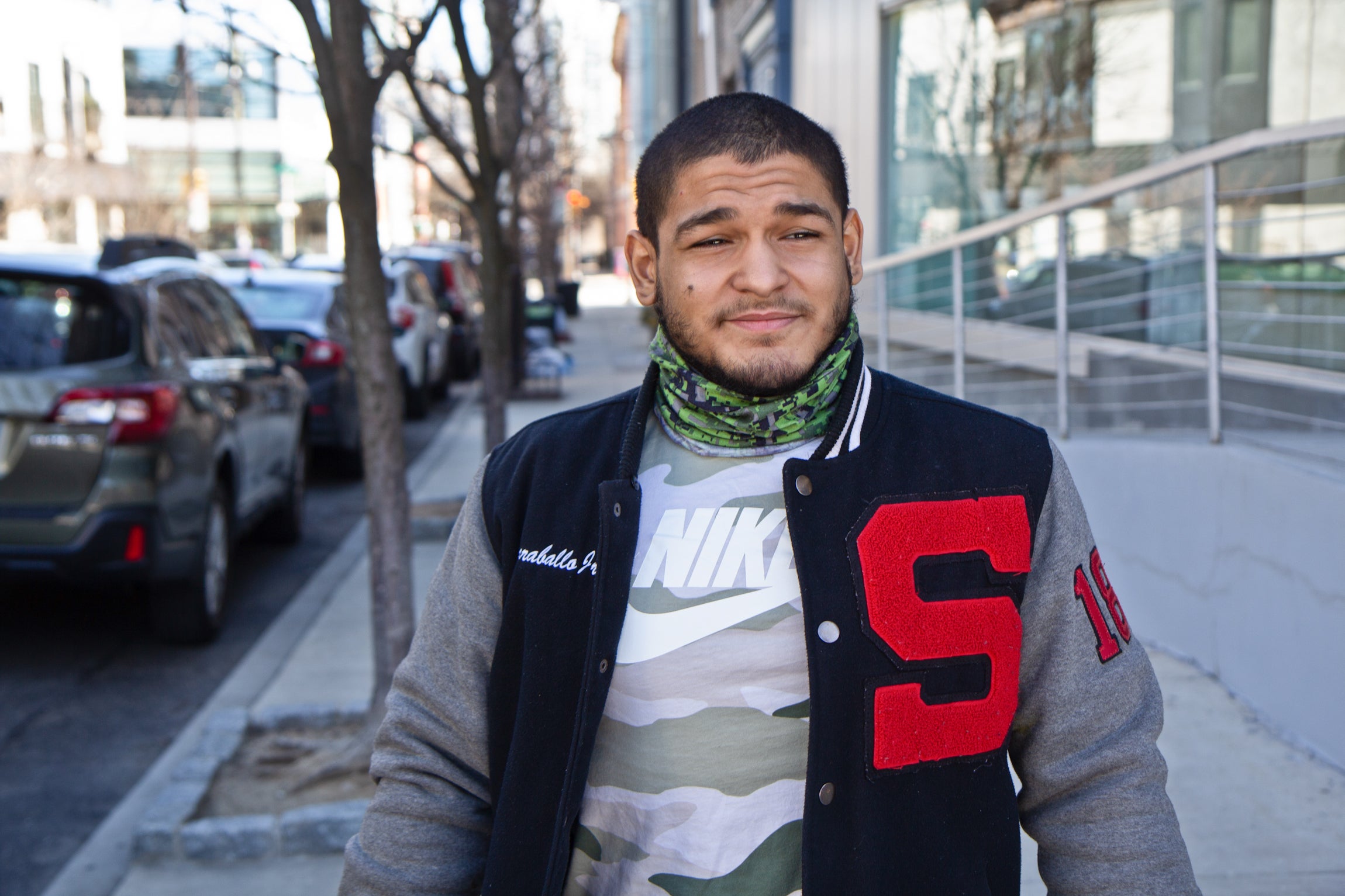
News of Tahj’s death rippled out like that: a text, a phone call, an Instagram message.
Schloss and Natale have lost students to gun violence before. But this was different.
“Ordinarily within a school there is a communal way of grieving,” Schloss said. “The fact is … there are probably a whole lot of people [at Southern] who didn’t know Tahj had been killed.”
The worst part, Natale said, is that without a way to remember together, it can be easier for the memory to fade.
“With this disconnect, you almost kind of forgot about it,” he said. “Because nobody was together to talk about it.”
Fighting to remember
Maintaining a lost loved one’s legacy and keeping their memory alive, has been a thread through many of the discussions Schooled had for this story.
That focus on memory is part of the natural grief process — but also, counselors say, a byproduct of society’s seeming indifference toward the cascade of predominantly young, Black and Latino men killed in cities like Philadelphia.
“We’re not giving this the gravity it needs. And the kids pay attention,” said Theresa Cheshire, the guidance counselor at Pickett. “They see it. They will talk about it. You give them space, and they’ll talk about it. They know they’re not cared about.”
Keeping the memory of those slain can be difficult in normal times. But it has gotten harder during the pandemic, as days and months drag on and then blink by, and mourning plays out on group messages, if at all.
Now, though, there is finally some light at the end of the tunnel. As a growing number of Philadelphians get vaccinated against COVID-19 and more schools are offering in-person classes, we may soon have more opportunity to live and grieve in the old way again — together.
In the meantime, friends, family, and educators of those lost to gun violence are finding ways to persevere.
Tahj Williams’ former teammate, Edgar Mendez, recently started an Instagram group message with his former coaches and teammates to bounce ideas around about a potential charity event in Tahj’s honor.
“It’s kind of sad we couldn’t really do anything during the time that he passed,” Mendez said. “Let’s not have this kid’s name in vain because of a pandemic.”
Angelo Walker’s memory lives in a pair of photos on Isabella DiBileo’s desk. One shows Angelo wearing a half-smile and a red jacket with a fur-fringed hood. In the other, Angelo sits slouched in a chair looking at his phone.
Both were taken in DiBileo’s office. And in both photos, Angelo looks comfortable — a kid in a safe place. That’s why DiBileo keeps them within arm’s reach.
“This job is really hard and some days I feel like I wanna quit,” DiBileo said. “I need to keep things like that to remind me why I do what I do.”
Angelo’s picture tells her that there are kids who need a counselor. They need that anchor. It’s a reminder that she has some purpose here — even on the roughest days.
For Tawanda Robinson, David Williams’ mother, thoughts of her son are constant.
Stuck inside by the pandemic, she’s turned her enclosed porch into a shrine to David.
There’s a picture of him as a baby, a neatly folded t-shirt from the store where he worked, a bible open to the book of Psalms. The walls and ceiling are painted blue and white, what Tawanda calls “the colors of heaven.”
And there’s a swing, where David used to like to sit.
On the worst days, Tawanda comes out, pulls up a chair, and watches that swing, waiting for any sign that her son hasn’t forgotten about her.
“You see the swing is moving? You see it’s rocking?” she asked during an interview. “I didn’t touch it. David knows. He was moving the swing. Do you see it?”
—
This episode of Schooled was written by Miles Bryan and Avi Wolfman-Arent. It was edited by Kevin McCorry. Emily Rizzo contributed reporting. Charlie Kaier engineered and mixed the podcast. Special thanks to Annette John Hall, Xavier Lopez and Emily Scott.
Schooled is made possible with support from the William Penn Foundation.
For more Schooled, listen below to a panel discussion of themes from this episode.

Get more Pennsylvania stories that matter
WHYY is your source for fact-based, in-depth journalism and information. As a nonprofit organization, we rely on financial support from readers like you. Please give today.



